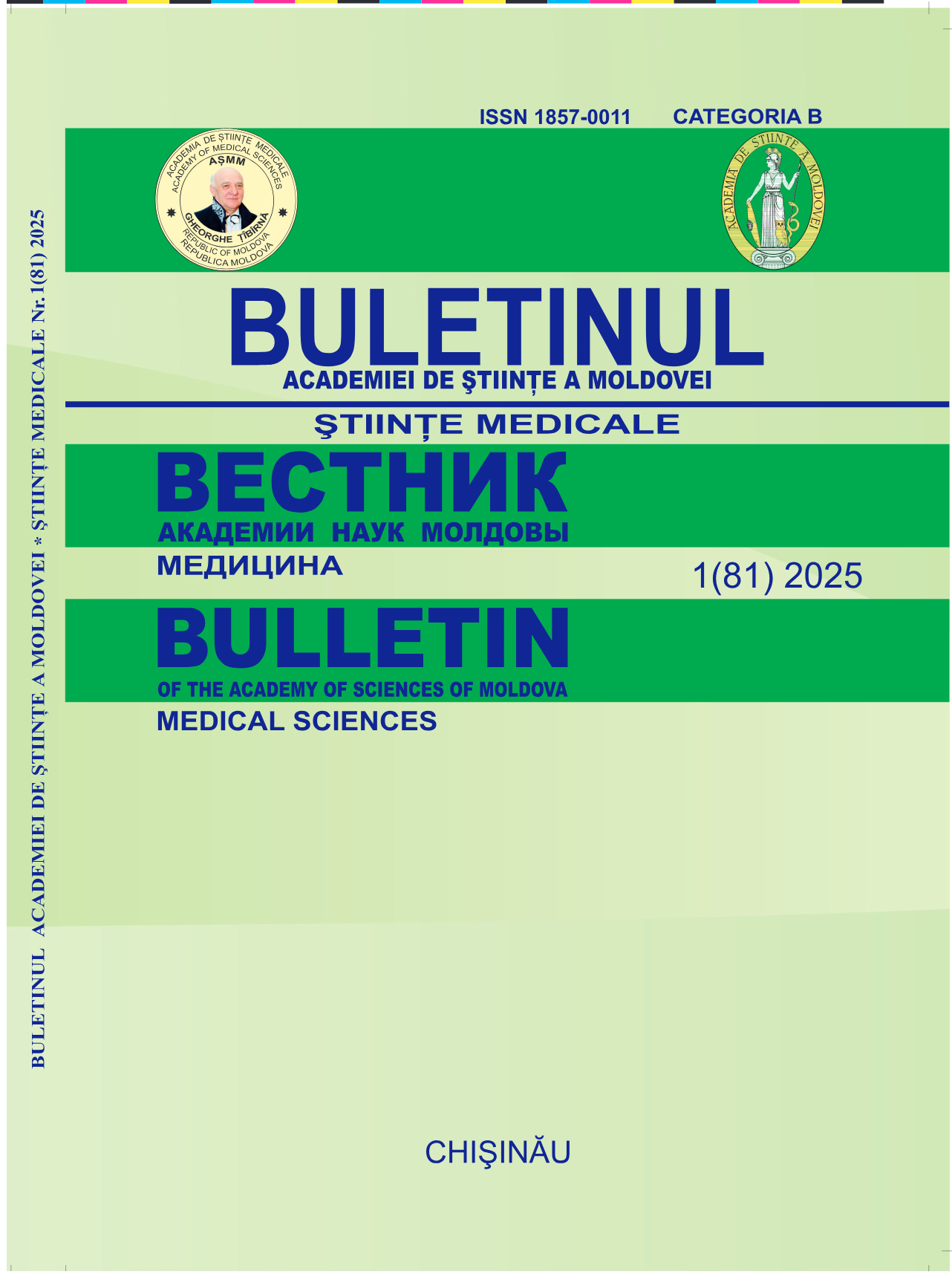The impact of renal denervation on physical exercise capacity and NT-proBNP levels in resistant hypertension and heart failure with preserved ejection fraction and or without type 2 diabetes mellitus
DOI:
https://doi.org/10.52692/1857-0011.2025.1-81.02Keywords:
renal denervation, resistant arterial hypertension, diabetes mellitus, heart failureAbstract
Introduction. Data from clinical trials suggest the effectiveness of renal denervation in improving cardiac function and exercise capacity in hypertensive patients with heart failure with preserved ejection fraction and reduced ejection fraction. The data presented are part of the literature review/results obtained within the institutional project with the acronym DIAFEREZIS. Aim. Comparative evaluation of the efficacy of renal denervation versus pharmacological treatment on exercise capacity and plasma NT-proBNP levels in patients with resistant hypertension, heart failure with preserved ejection fraction in association or without type 2 diabetes mellitus at two years of follow-up. Materials and methods. To achieve the research objectives, a prospective, open, randomized clinical trial was conducted that enrolled 250 eligible patients with resistant hypertension and heart failure with preserved ejection fraction. Patients were divided into two groups of 125 subjects each depending on the presence of type 2 diabetes mellitus, subsequently, each group was randomized into three evaluation groups in accordance with the treatment supplemented to the previously administered standardized one: groups I and IV - Moxonidine, groups II and V - Bisoprolol and patients in groups III and VI underwent renal denervation. Patients were evaluated for a period of 2 years. Results. Patients in all research groups demonstrated an authentic increase in the distance covered in the „6-minute walk” test already at 6 months of evaluation, this dynamic being comparable in the pharmacological and interventional treatment groups in patients without diabetes, while in the group of resistant hypertensive patients with type 2 diabetes, the group of patients undergoing RDN shows statistical superiority in improving this parameter.Increased at the initial stage in all six research groups, the plasma level of NT-proBNP recorded a statistical reduction when applying all three therapeutic approaches in both patients without and with type 2 diabetes already at 6 months of monitoring, the groups of patients undergoing RDN showing statistical superiority in improving this parameter, a notable event until the end of the surveillance period.Conclusions. Both pharmacological treatment with the SNS blockers Moxonidine and Bisoprolol, and the minimally invasive one with RDN improved the exercise capacity of patients with resistant hypertension, HF with preserved ejection fraction with or without type 2 diabetes mellitus already at 6 months of evaluation, the beneficial effect being amplified until the end of the surveillance period. Comparative analysis of the dynamics of the distance covered in the „6 min walk” test reveals a statistical superiority of RDN versus both pharmacotherapeutic regimens at the earlier stages in the group of patients with type 2 diabetes mellitus and starting with 12 months of evaluation in the group of non-diabetic patients, the trend manifesting until the end of the study.The authentic reduction of the plasma level of NT-proBNP was marked in all research groups from the first monitoring stage independently of the presence of type 2 diabetes mellitus when applying all three treatment schemes, RDN demonstrating a superior therapeutic efficiency compared to both therapeutic regimens.
References
Mancia G, Kreutz R, Brunström M et al. 2023 ESH Guidelines for the Management of Arterial Hypertension The Task Force for the Management of Arterial Hypertension of the European Society of Hypertension. J. Hypertens., 2023; 41:1874–2071.
McEvoy JW, McCarthy CP, Bruno RM et al. 2024 ESC Guidelines for the Management of Elevated Blood Pressure and Hypertension. Eur. Heart J., 2024; 45:3912–4018.
Dornas WC, Silva ME. Animal Models for the Study of Arterial Hypertension. J. Biosci., 2011; 36:731–737.
Böhm M, Linz D, Urban D et al. Renal Sympathetic Denervation: Applications in Hypertension and Beyond. Nat. Rev. Cardiol., 2013; 10:465–476.
Jarrah M, Khader Y, Alkouri O et al. Medication Adherence and Its Influencing Factors among Patients with Heart Failure: A Cross Sectional Study. Medicina, 2023; 59:960.
Cheng C, Donovan G, Al-Jawad N, Jalal Z. The Use of Technology to Improve Medication Adherence in Heart Failure Patients: A Systematic Review of Randomised Controlled Trials. J. Pharm. Policy Pract., 2023; 16:81.
Huber M, Busch AK, Stalder-Ochsner I et al. Medication Adherence in Adults after Hospitalization for Heart Failure: A Cross-Sectional Study. Int. J. Cardiol. Cardiovasc. Risk Prev., 2024; 20:200234.
Moiseeva A, Carauș A. Corelația reducerii valorilor tensionale cu ameliorarea gradului de insuficiență cardiacă la pacienți cu hipertensiune arterială rezistentă la tratament. Buletinul Academiei de Științe a Moldovei. Științe medicale, 2020; vol.1(65), pp. 228-231.
Moiseeva A, Cărăuș A, Popescu L., Cărăuș M. Evoluția nivelului plasmatic a peptidei natriuretice cerebrale (tip-B) N-terminală sub tratament de lungă durată cu blocanți ai sistemului nervos simpatic în hipertensiunea rezistentă. Romanian Journal of Cardiology, 2019; vol. 29, Suppl., pp. 272-273.
Downloads
Published
License
Copyright (c) 2025 Bulletin of the Academy of Sciences of Moldova. Medical Sciences

This work is licensed under a Creative Commons Attribution 4.0 International License.



